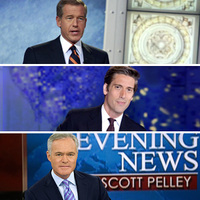One mass media ritual that's a reliably renewable resource is the post-election poring over pollsters' data.
Who got the results most right ahead of time naturally preoccupies the industry most of all, but so do more arcane, and often really quite useful analyses of detail. Like demographic breakdowns of the voting population ... the chief motivating concerns of voters ... relative turn-out by party, gender or age ... and so on.
The perennial nature of such post-mortem dissection has just been impressed upon me personally, because while this column has been celebrating its 10th anniversary, loud echoes have resounded from November 2004's election. That was when the column - still brand-new - was delving into just how well that year's media pollsters had been doing their jobs.
2004 was a Presidential vote, of course, and this year brought the Congressional and gubernatorial mid-terms ... so there are bound to be big differences. But some similarities - maybe perpetual truths? - are nonetheless striking.
One similarity was the paranoia evident among the mass media that their own pollsters' expensively gleaned predictions might turn out to be wrong. For THE MEDIA BEAT of November 4, 2004, (under a headline about even those who study past mistakes being doomed to repeat them) I reported on a so-called "boiler-room" established above a former Woolworth's store in Somerville, New Jersey. This was the Edison-Mitofsky polling organization's nerve-center.
E-M had been formed by a consortium of ABC, CBS, NBC, CNN, Fox News and the Associated Press, with big-city newspapers like The New York Times coming on board as subscribers. Weighing heavily on everyone's mind (spreading paranoia, in essence) was the fear that they would repeat the infamous predictive disaster of 2000's Presidential election, when first NBC, and then other networks (working from exit-poll returns) wrongly called Florida for Al Gore and not George W Bush.
Well guess what? - there was a something of a repeat in 2004. By midway through Eastern voting hours on November 9th 2004, in fact, Edison-Mitofsky's clients were fully persuaded that an overall John Kerry victory over incumbent George W Bush was absolutely certain. Mercifully though, all the TV networks kept to their agreement among themselves to publicly announce nothing until all polls had closed, and by then - even more mercifully - the picture had changed.
It's worth recalling that the service used by the networks for that unnerving 2000 mess-up was Voter News Service, a precursor to Edison-Mitofsky. More curiously perhaps, VNS was co-founded by Warren Mitofsky (a pioneer of exit-polling since 1967, and later of course the eponymous partner in E-M along with the Edison Media Research company). Unsurprisingly, the VNS consortium was ignominiously dissolved in the wake of the Florida fiasco, giving Mitovsky his opportunity to create that new business, E-M, for subsequent elections. He didn't, however, get to analyze many more of them, because he succumbed to a fatal aneurysm in September 2006.
I suppose that in 2014 we should be grateful that no egregiously erroneous predictions bedeviled the election process and its coverage. Today's TV-networks-plus-AP consortium dedicated to polling research, now graced with the name National Election Poll, was commendably judicious throughout the pre-election period, and on the day itself was studiedly guarded in all its output, throughout the voting and counting hours.
The thing is, though - it didn't lower the media's paranoia. It just made everyone somewhat edgy in everything they had to say about predictions. Many reporters and commentators found themselves trudging hesitantly through deep over-compensation. I actually got rather weary of so many outlets cautioning us about "razor's edge" margins in certain races - races which of course ended up being runaway successes for the Republican Party.
But all the same, I'll still welcome such abundance of caution over journalistic recklessness - any day.
****
Read more of David Tereshchuk's media industry insights at his regular online column, The Media Beat at its new site. The Media Beat podcasts are always available on demand from Connecticut's NPR station WHDD, and at iTunes.